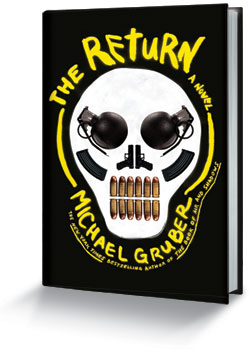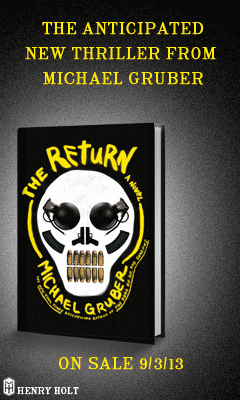The Return
by Michael Gruber
Like most people, New York book editor Richard Marder has no idea when he will die. Unlike most people, though, he has a pressing reason to fixate on the timeline. A recently discovered and completely inoperable anomaly in his brain could burst at any time, causing immediate death if Marder's lucky and a permanent vegetative state if he's not. Any other man in the same position might take early retirement and spend his remaining days in the bosom of his loving family, but Marder, a widower, has other plans, plans that will take him far from home and require him to draw strength from a side of himself he thought he had buried, to use skills he never expected to need again. Instead of going gently into that good night, Marder sets his affairs in order, uses part of the fortune he made by stubbornly hanging onto his Apple stocks since the 1980s to buy a beach house in Playa Diamante in the state of Michoacán, Mexico, and bids goodbye to his old Vietnam buddy Patrick Skelly, keeping the details of his journey and destination as cryptic as possible.
As Marder expected, the secrecy proves irresistible to Skelly, who shows up unannounced in Marder's camper at a rest stop in Virginia. Although Marder pretends annoyance, he had counted on Skelly's curiosity to get the better of him. His plans will take him deep into areas of Mexico controlled by drug lords and gangsters, and a man of Skelly's skill set and practical yet somewhat warped moral code will come in handy. To Skelly, however, he maintains the pretense that he intends only to fulfill his wife's last wishes and scatter her ashes in her hometown.
Years ago, Marder met a girl named Maria Soledad Beatriz De Haro d'Aries--called Chole--in Playa Diamante. They fell deeply in love, but Chole's parents had already arranged a match for her with a powerful family. When the lovers eloped, Chole's father disowned her. Building a family with Marder in America never fully healed Chole's longing for her home, and now their son blames him for her untimely death. However, their daughter, Carmel, nicknamed Statch, not only remains in contact with Marder but actively keeps tabs on him. An MIT grad student, Statch uses her technological savvy to monitor her father's accounts without his knowledge, watching for any sign that Chole's death has triggered unhealthy behavior in her father. Although Marder tells her he's going to do some traveling, Statch becomes concerned when he stops answering his cell phone, concerned enough to track and follow her father all the way to Mexico, unaware of the dangers she will face.
Marder's memories of his time in Vietnam with Skelly are intermingled into the present-day narrative as Marder draws parallels between their experiences defending the Hmong culture from the Viet Cong and their attempts to bring a safe and prosperous way of life to the Mexican families they find squatting in Marder's new house and the surrounding development. With Marder's money and the technical know-how of Skelly and Statch, their compound is well on its way to autonomy, but the two local drug cartels won't relinquish control so easily. Skelly and Marder have set a collision course with a cabal of trained killers, and they'll need all the wits, firepower and help they can muster to survive.
Gruber certainly knows how to hook readers. A highly relatable protagonist with a wild-card sidekick, skillful pacing, smart one-liners and plenty of artillery tilt this thriller in the blockbuster-style direction. Gruber crafts action scenes compelling both in their clever execution and the authenticity with which he describes firearms without losing the tension of the moment.
However, Gruber offers readers food for thought as well. While his story is entertaining, he also manages to comment quite effectively on relations between Mexico and the United States. According to Marder, Americans are largely oblivious to Mexican life, even though Mexico City, one of the world's largest metropolitan areas, is a seat of culture and fashion. Mexican cynicism toward the United States' ignorance is personified in Pepa Espinoza, a beautiful and brilliant reporter who risks her life by reporting the truth about the drug gangs. Although Marder offers her assistance and safety, Pepa initially finds it difficult to trust him or their mutual attraction, but eventually finds herself in alliance with the quixotic American. Also highlighting the cultural differences is Statch, whose graduate studies at MIT focus on 3D printing, the success of which could end mass production as we know it. After spending time in her mother's country, though, Statch must rethink which half of her heritage lays greater claim to her heart.
A heady mix of military action, vigilante justice and modern-day Mexican life underscored by the question, "How would you choose to finish your life?", this meaty but never maudlin thriller is smart, inventive and sure to leave readers with pounding pulses and soaring imaginations. --Jaclyn Fulwood









 Even the idea of what Mexico looks like comes from the parts of Mexico you can see from El Paso. It's sandy, it's got cactuses, it's got sagebrush. Mexico's a huge country, with all kinds of different topography. It's like if you were to draw a map of the entire United States that looked like the Jersey Shore, because you saw it from a boat and assumed the entire United States looked just the same.
Even the idea of what Mexico looks like comes from the parts of Mexico you can see from El Paso. It's sandy, it's got cactuses, it's got sagebrush. Mexico's a huge country, with all kinds of different topography. It's like if you were to draw a map of the entire United States that looked like the Jersey Shore, because you saw it from a boat and assumed the entire United States looked just the same.